More Disappointment In Baltimore As Third Officer Acquitted In Death Of Freddie Gray
By Barrington M. Salmon -Contributing Writer- | Last updated: Jul 26, 2016 - 3:09:24 PMWhat's your opinion on this article?
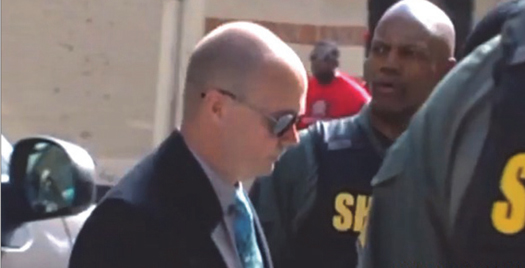
Baltimore Police Officer Lt. Brian Rice, July, 8. Photo: MGN Online
|
The Rev. Derrick Harkins said he has followed the trials of the six officers implicated in the death of Baltimore native Freddie Gray all while expecting justice to prevail.
Thus far, Harkins, Baltimore residents and Black Americans alike, have been sorely disappointed since the trials began in downtown Baltimore in January.
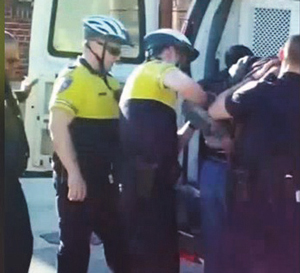
Still from video of Baltimore police officers arresting Freddie Gray. Mr. Gray died after being hospitalized for spinal injuries in 2015. Photo: MGN Online
|
Like two of his predecessors, Rice, opted for a bench trial instead of having his case heard by a jury and became the third officer to be acquitted by the judge. Judge Williams has consistently hammered the prosecution for not presenting convincing evidence. According to media reports, Williams explained to prosecutors that they failed to establish that Lt. Rice was aware of his duty to buckle Gray’s seat belt in the paddy wagon. And further, he added, they did not prove intent – that Rice deliberately flouted his duty so as to put Gray in danger.
“There are a number of possibilities this court could entertain, some that are innocent and some that are not. However, the burden of proof rests with the state, and the court’s imaginings do not serve as a substitute for evidence,” Judge Williams said.
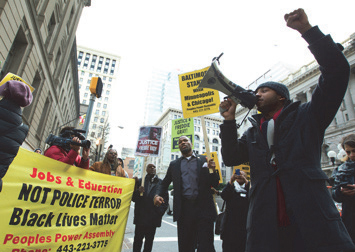
Mr. Gray’s death angered Black residents in Baltimore city and triggered days of civil unrest. A mistrial was declared in the trial of William Porter, another officer involved in the case, on Dec. 16, in Baltimore Md. Photo: Final Call file
|
“I think it’s a grievous thing. This string of acquittals, in this case, points to systemic flaws in the justice system,” said Rev. Harkins, senior vice president for Innovation in Public Programs at Union Theological Seminary in New York. “There is a presupposition that police are operating with good intent, even when they’re not. There is no pursuit of justice. There is always a presumption that law enforcement is acting above reproach.”
Who will be held accountable?
Gray died in April 2015 following his arrest after running away from the police who were patrolling a high-crime area. Officers handcuffed and shackled Gray but left him unbuckled in the back of a police van. Telephone videos of his arrest show an obviously injured Gray being dragged between two bicycle cops to a paddy wagon. He suffered fatal spinal injuries from an almost severed spine. City officials had been circumspect in releasing details of the circumstances surrounding Gray’s death, but it is believed by many observers that Gray’s injuries came after he was given what’s called a “rough ride” where those in police custody are left unrestrained and are violently tossed around a fast-moving police van.
The 25-year-old’s death angered Black residents in Baltimore city and triggered rioting, looting and days of civil unrest. Arsonists torched businesses and more than 100 police officers were hurt in confrontations with those who’d taken to the streets. Shortly after Gray’s death, The U. S. Department of Justice opened a “patterns and practice” investigation into allegations of widespread abuse and unlawful arrests by the Baltimore Police Department.
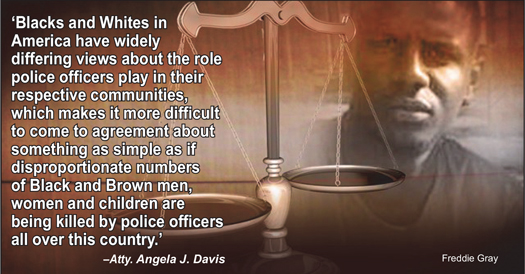
Freddie Gray
|
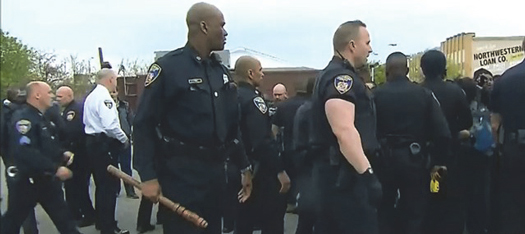
Police observe protesters in Baltimore, MD. Blacks and Whites in America have differing views on police conduct. Photo: MGN Online
|
Freddie Gray became at the time, another martyr whose name was lifted up by members of the Black Lives Matter movement, a coalition of Millennials who brought nationwide and international attention to the extrajudicial killings of Black people and the unequal and unjust way that people of color are treated by the criminal justice system.
On the heels of unrest stemming from Gray’s death, Baltimore State’s Attorney Marilyn Mosby moved aggressively to charge the six officers implicated in Gray’s death. And with the string of acquittals, Mosby is under heavy fire from critics who say she overplayed her hand by the severity of the charges she brought. The police union and some lawyers are arguing that Mosby’s actions are politically motivated and there is an effort afoot to disbar her. In addition, the officers on trial have filed suit against her and Mosby is being pressed to not pursue the other cases.
Although she hasn’t followed the trials closely, American University Law Prof. Angela J. Davis said she and her colleagues in the legal profession are aware of just how difficult it is to get convictions in cases like these.
“A lot of us were saying that it’s easy to bring charges but it’s much, much harder to get a conviction,” said Davis, a professor at the AU Washington College of Law and former director of the D.C. Public Defender Service where she began as a staff attorney. “A part of the problem is the prosecutor. The only person in the system who can hold police responsible is the District Attorney. You have Robert McCulloch in Ferguson, and the District Attorney in Staten Island. There was no indictment there. McCulloch went to the grand jury and acted as if he was the officer’s defense attorney.”
Prosecutors have everything to do with accountability. You have to have prosecutors willing to take those steps. I don’t think (former Chicago State’s Attorney) Anita Alvarez was ever going to charge that cop if the judge had not forced the police department to release the video.”
Prof. Davis was referring to the LaQuan McDonald case where Officer Jason Van Dyke shot the 17-year-old 16 times and police officials justified the killing as Van Dyke fearing for his life.
Davis said there’s a crisis in the criminal justice system and the key to substantive reform rests with prosecutors. She offered an impassioned plea for movement towards this change at a lecture she gave recently.
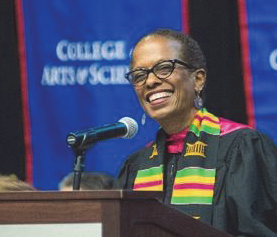
American University Law Prof. Angela J. Davis. Photo: Twitter.com
|
America, Davis added, has the dubious distinction of having five to eight times more people in prison than any liberal democracy in the world. The federal prison system has ballooned 800 percent in the past 30 years because of mandatory-minimum sentencing laws and the War on Drugs, and anti-drug abuse laws have landed first-time offenders behind bars for 5-10 year mandatory minimums. President Bill Clinton in 1994 spearheaded legislation that reduced eligibility for parole and increased sentences. The growth in the prison industrial complex exploded in the 1990s and some numbers – 35 percent of felony filings and prison admissions – are completely driven by prosecutors, Prof. Davis said.
“He recently admitted that his laws added to the incarceration rates,” Davis said of Clinton. “The sentences are extreme, overly punitive and irrational. People have received decades, even life. And prosecutors have been involved. They were given the tools to put people in prison, but prosecutors have the option to charge or not charge. The final decision belongs to the prosecutors.”
“Crimes recommended by the police can be (foregone) altogether. It’s totally within the discretion of the prosecutor. Ninety-five percent of all criminal cases are resolved by guilty pleas. Prosecutors control almost the entire criminal justice system.”
That control extends to whether to pursue or dismiss charges against a defendant, determining the severity of the charge, a misdemeanor or a felony, and whether and how much time a person will serve.
Finding and electing progressive prosecutors is the key, Prof. Davis said. There are those like John Chisholm in Milwaukee, Wisconsin and Brooklyn, New York Prosecutor Ken Thompson who are developing and implementing creative solutions to this issue.
A broken criminal justice system
Another key to fixing the flaws in the criminal justice system is police training.
“One of the big problems is a lack of training. There are no national training standards or nationally required training, so everyone’s doing their own thing,” said Prof. Davis. “President Obama convened a task force on policing which recommends consistent training, guidelines and a curriculum. I’m not sure how that would be enforced. The federal government can provide incentives but it can’t force police departments to do anything.”
That training also has to include reducing or eliminating the impact of implicit bias with specific training focused on this, Davis and others say. That way, when a police officer sees a Black or Brown face, he won’t react with fear and immediately reach for his gun.
Blacks and Whites in America have widely differing views about the role police officers play in their respective communities, which makes it more difficult to come to agreement about something as simple as if disproportionate numbers of Black and Brown men, women and children are being killed by police officers all over this country.
“The consistency of that different perspective has been clear for at least for the past 20 years. Black folks, in a sophisticated and nuanced way, understood that it wasn’t about OJ’s guilt or innocence but about the manner in which the police had been treating Black people,” said Rev. Harkins. “We know it first hand as a Black man. We know it viscerally. Unfortunately, there are significant numbers of others who don’t deal with this or see it day-to-day. To other folk, it’s a concept and they would rather not address it.”
As each trial has drawn to a close, the frustration and resignation of Black Baltimoreans continues to simmer. Activists have not stopped protesting, nor ceased to demand recompense from politicians and city officials, to no avail.
The question Rev. Harkins and others concerned about the relentless attacks on primarily unarmed Black men, women and children ask, is how long this untenable situation will continue before people’s anger boils over.
While she applauds Mosby for her attempts to exact justice in the Gray case, Prof. Davis said she has other questions.
“I think it’s great that she aggressively went after the cops but what is she doing in every day affairs? Why does Baltimore’s criminal justice system have some of the worst disparities in the country?” Prof. Davis asked. “I would like to know whether she’s addressing racial disparities in Baltimore and over-incarceration. I have not heard her talk about that.”
“John Chisholm is doing more to try to reduce racial disparities and reduce incarceration than she is. Why is that? I don’t see her doing that. Ken Thompson in Brooklyn has been doing some progressive things there. There are some out there who are doing it differently and trying to make a change. She and others must begin really addressing the crisis of mass incarceration in this country. If I lived in Baltimore, that’s what I’d be asking. She has a diversion program for first time offenders but that doesn’t do much.”
Rev. Hawkins agrees about the urgent need to overhaul the criminal justice system. The Gray killing, he said, is unalterably linked to the recent shooting deaths by the police of Philando Castile in Falcon Heights, Michigan and Alton Sterling in Baton Rouge, Louisiana. As well as to the shooting deaths of police officers in Dallas, Texas and Baton Rouge.
“There needs to be systematic change in the criminal justice system. Conversation is difficult but we can’t let that silence voices saying there has to be reform,” he said. “Thank goodness for cellphones and videophones. Now that we have that, we need a system now that is just and which holds police officers accountable. I thought (Mosby) would be able push for justice, but that has not happened with these acquittals. They’re coming at her and her husband from every direction. It’s sad but not surprising.”
INSIDE STORIES AND REVIEWS
-
-
About Harriett ... and the Negro Hollywood Road Show
By Rabiah Muhammad, Guest Columnist » Full Story -
Skepticism greets Jay-Z, NFL talk of inspiring change
By Bryan 18X Crawford and Richard B. Muhammad The Final Call Newspaper @TheFinalCall » Full Story -
The painful problem of Black girls and suicide
By Charlene Muhammad -National Correspondent- » Full Story -
Exploitation of Innocence - Report: Perceptions, policies hurting Black girls
By Charlene Muhammad -National Correspondent- » Full Story -
Big Ballin: Big ideas fuel a father’s Big Baller Brand and brash business sense
By Bryan Crawford -Contributing Writer- » Full Story






 Click Here Stay Connected!
Click Here Stay Connected!








